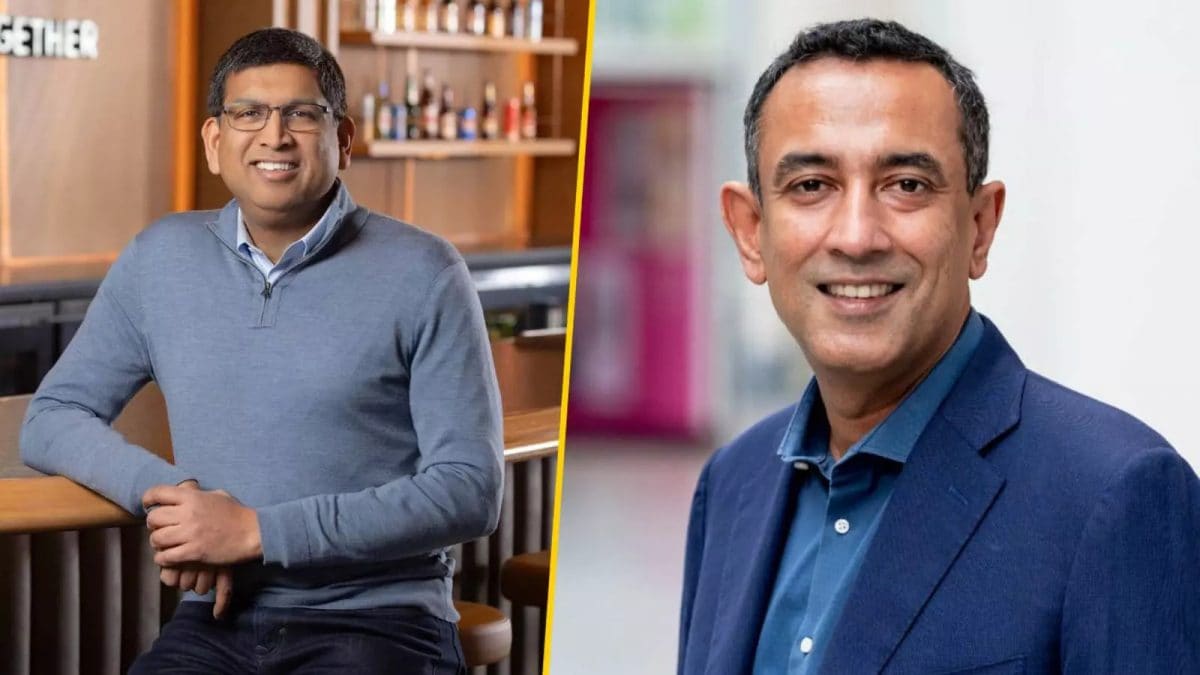Last Updated:
Amid tightening H-1B visa rules, T-Mobile and Molson Coors have appointed India-born executives to their top leadership roles

Who are Srinivas Gopalan and Rahul Goyal?
At a time when the Donald Trump-led US administration is tightening H-1B visa rules, two major American companies — T-Mobile and Molson Coors — have appointed India-born executives to their top leadership roles.
T-Mobile Names Srinivasan Gopalan as CEO
T-Mobile announced on Monday that insider Srinivasan Gopalan will take over as CEO from Mike Sievert on November 1, marking a key leadership transition as the telecom giant works to defend its 5G lead in a saturated US wireless market.
Wireless carriers are facing slowing subscriber growth, intensifying competition, and cautious consumers unwilling to pay for premium plans.
In a LinkedIn post, Gopalan wrote: “This team’s success reflects the remarkable leadership of my friend and mentor Mike Sievert, and I appreciate the trust he’s placed in me as he takes on his new role as vice chairman. I’m excited to continue partnering with him as we continue to rewrite the rules of wireless for the good of our customers.”
T-Mobile’s $26 billion merger with Sprint in 2020 reshaped the US telecom industry, consolidating Verizon, AT&T, and T-Mobile as the “big three” players, while drawing antitrust scrutiny. Sievert, CEO since April 2020, will now transition to the newly created role of vice chairman, advising on long-term strategy, innovation, and talent development.
Craig Moffett, analyst at MoffettNathanson, told Reuters, “Gopalan brings a wealth of experience and is a very impressive leader, and they’ve handled this transition exceptionally well. I don’t expect there to be any fall-off at all in T-Mobile’s performance.”
Gopalan, currently T-Mobile’s COO, has previously held senior positions at Bharti Airtel, Capital One, and Vodafone. He also served as CEO of Deutsche Telekom’s Germany business, where he doubled growth rates and scaled the company’s fibre business.
Molson Coors Appoints Rahul Goyal as Next CEO
Beer major Molson Coors on Monday named Rahul Goyal as its next CEO, succeeding Gavin Hattersley, who is set to retire later this year.
Goyal, originally from India, studied engineering in Mysore before moving to the US for business studies in Denver. He has held leadership positions across Coors and Molson brands in the US, UK, and India. His elevation comes as the company faces declining beer demand and rising tariffs in the US.
In a LinkedIn post, Goyal said: “With a historic legacy of amazing brands supported by a talented team of employees and a strong network of distributors, customers and partners around the world, it’s a privilege to be part of this great company – and I’m ready to take on the opportunities and challenges ahead with the right brands, the right people and the passion to deliver on our ambitions.”
Zak Stambor, analyst at EMarketer, noted: “Few executives know Molson Coors better than Rahul Goyal. His cross-company experience and role in pushing the brewer beyond beer position him to meet fast-changing consumer demands.”
US Tightens H-1B Visa Rules
The leadership changes come amid fresh US visa restrictions. On September 21, President Donald Trump signed a proclamation requiring a payment of USD 100,000 to supplement H-1B petitions for new applications. The rule is effective for 12 months unless extended, and applies only prospectively, leaving existing visa holders unaffected.
Indian IT firms, which account for nearly 70% of all H-1B visas annually, may face higher costs over the next 3–6 years as renewals come up. Since each petition, valid for three years and extendable by another three, attracts the fee, costs could rise significantly.
According to Morgan Stanley estimates, the gross impact on EBIT margins could range from 10–120 basis points, translating into a 0.5–8.5% drag. However, mitigants such as offshoring and renegotiated pricing could limit the net impact to about 50 basis points (3–4% of EBIT).
Over the last decade, Indian IT companies have steadily reduced their dependence on H-1B visas, expanding local hiring in the US and nearshoring to Canada and Latin America. This trend accelerated during the COVID-19 pandemic, leading to a higher offshore mix and reduced vulnerability to US immigration policy changes.

Aparna Deb is a Subeditor and writes for the business vertical of News18.com. She has a nose for news that matters. She is inquisitive and curious about things. Among other things, financial markets, economy, a…Read More
Aparna Deb is a Subeditor and writes for the business vertical of News18.com. She has a nose for news that matters. She is inquisitive and curious about things. Among other things, financial markets, economy, a… Read More
September 23, 2025, 14:53 IST
Read More







